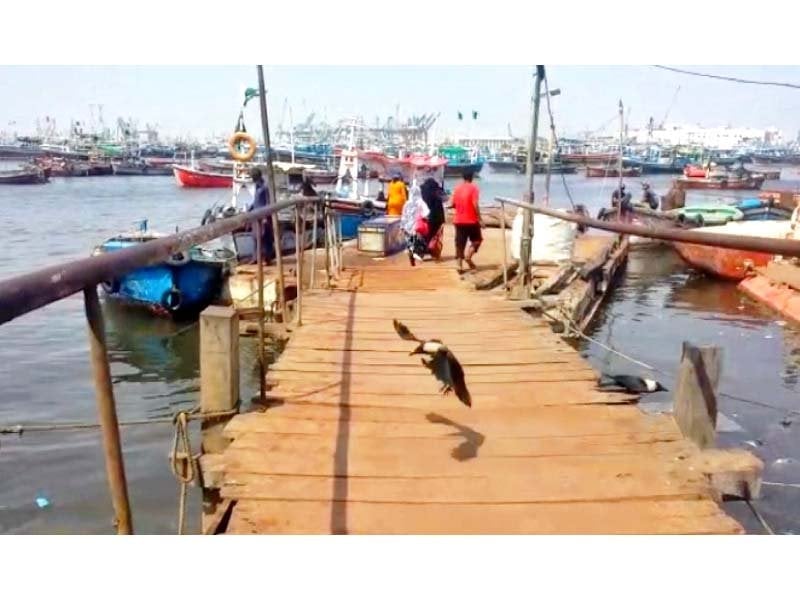
Islands and archipelagos, the world over, are distinctly developed and commercially advanced in the hopes of bolstering the tourism sector of the native country however, far from reaching the luxurious standard of popular holiday destinations, the islands of Baba and Bhit, outlining Pakistan’s coastal hub, Karachi, present a devastating picture, as thousands of indigenous households suffer endlessly in the absence of rudimentary necessities for survival like gas, water and healthcare.
Since their discovery during the colonial era, the twin islands of Baba and Bhit, lying a boat ride away from the port city, are home to a large community of fishermen, who predominantly rely on marine fisheries for maintaining their day-to-day livelihood. These fishermen and their families, known colloquially as the ‘Katchi’ communities, have been deprived of basic human and civil rights like tap water, education and even healthcare since time immemorial, presenting a challenge for locals, who require any of these facilities.
“There are no maternity facilities available for pregnant women in these islands. Therefore, any woman who requires a prenatal checkup or is in labor, has to first travel to Kemari on a boat before she can reach a hospital in the city,” revealed Razia Bibi, who urged the government to invest in adequate healthcare facilities in the islands, so that locals do not have to travel to the city for treatment.
According to Hasan Ali Bhatti, a social leader, the three centuries old islands of Baba and Bhit, which house a sizeable population of 35,000 people, have no state provided healthcare, education or tap water facilities.
“There is no laboratory, big hospital or maternity home in both these islands. Furthermore, only one school exists in each island, while colleges are entirely out of sight. The two islands have the worst water crisis, since water has to be supplied by boats, which sell the commodity at high prices,” informed Bhatti. Quite expectedly, the lack of sanitation facilities was evident in the high rate of infectious disease reported among the island’s locals, as Dr Rano Lohana, a doctor at the Bhit Shah Dispensary in Bhit Island, disclosed that skin and stomach diseases were highly common due to poor hygiene practices.
“Apart from the water crisis, our gas supply has also been suspended since over a year while electricity too had not been available over the past two weeks since we could not pay the bills. Over the past few years, due to sea pollution, the scale of our catch has decreased, landing us in a financial quandary. Therefore, we cannot pay exorbitant utility bills,” shared Muhammad Kachhi, a local fisherman, who anticipated what Ramazan would look like without the fundamental utilities.
Sympathizing with the fisherman, Salman Bhatti, Chairman of the Union Council of Bhat Island, agreed that the life of poor fishermen had become miserable due to the recent suspension of electricity and long-term unavailability of gas. “In the houses where earlier the electricity bill was Rs2000 to Rs2500, now the bills are RS10,000 to 15,000. How can a poor person be expected to pay such a huge amount,” questioned Bhatti. Even though, the supply of electricity was restored in recent times, the gas crisis continues to haunt locals, forcing many to adopt environmentally harmful practices like burning mangrove trees for fuel. “This is truly alarming. Mangrove trees help in reducing marine pollution, and deforestation will definitely threaten marine life,” warned, Moazzam Khan, Technical Advisor at the World Wildlife Fund for Nature (WWF).
Speaking to the The Express Tribune on the matter, the spokespersons of K-Electric and the Sui Southern Gas Company (SSGC), maintained that Rs729 million were due in electricity bills while 95 percent of the locals of the Baba and Bhit islands had not paid their gas bills. “The responsibility of determining the rates of electricity bills is not under the jurisdiction of the electricity distribution company,” justified the official from K-Electric. The administration only disconnects the connections of those households that have not paid their bills for a long time,” asserted the official from SSGC.


1725877703-0/Tribune-Pic-(5)1725877703-0-165x106.webp)



1726722687-0/Express-Tribune-Web-(9)1726722687-0-270x192.webp)














COMMENTS
Comments are moderated and generally will be posted if they are on-topic and not abusive.
For more information, please see our Comments FAQ